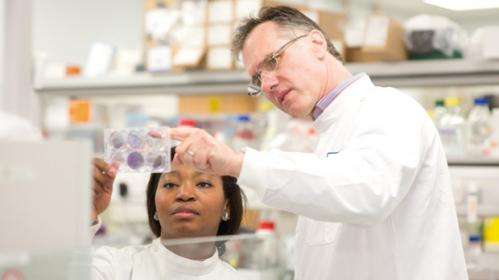Cancer Research UK launches trial of new lymphoma treatment

Cancer Research UK's Drug Development Office (DDO) has launched a new clinical trial to treat lymphoma patients using the body's own immune system to attack cancerous B-cells growing out of control.
B-cells are specialised immune cells that work as the factories of the immune system, pumping out antibodies into the blood stream. These antibodies then act as seeker missiles, homing in on targets recognised as harmful to the body and directing immune cells to attack them.
But in B-cell lymphomas, the B-cells themselves are the problem as far more are produced than the body needs. This new therapy uses the body's own weapons against the tumour. In this trial an antibody, called DI-B4, has been designed to target a molecular marker, which is specific to B-cells and young cells destined to become B-cells. By binding to this marker, the antibody signals other immune cells to attack and destroy these B-cells.
B-cell lymphomas account for more than nine in 10 of all Non-Hodgkin lymphomas (NHL) with an estimated 10,500 cases every year in the UK.
This is an early phase trial to test how 40 patients will deal with the drug which will be led from Southampton General Hospital, with other centres including The Christie hospital in Manchester, the Royal Liverpool University Hospital and the Oxford University Hospital. The study will last four and a half years with an 18 month follow up.
These centres are part of Cancer Research UK's network of Experimental Cancer Medicine Centres (ECMCs) which bring together cancer doctors and scientists to speed up the flow of ideas from the lab bench to a patient's bedside.
Dr Andy Davies, Cancer Research UK medical oncologist and lead researcher for the study from the University of Southampton, said: "Adapting the immune system to fight cancer has become a powerful weapon. Drugs like rituximab, which targets a different B-cell marker, have helped many patients, but far too many relapse or become resistant. DI-B4, which targets a marker of both B-cells and the cells that will grow up to be B-cells, could be a more effective treatment and an important alternative for these patients."
Dr John Radford, Professor of Medical Oncology at the University of Manchester's Institute for Cancer Sciences and trial lead at The Christie NHS Foundation Trust – part of the Manchester Cancer Research Centre, said: "New treatments have made a real impact for patients with lymphoma, but we need more therapies for those with tumours that become resistant. This trial of a new antibody treatment for B-cell lymphoma offers new hope for patients who have otherwise run out of options. It's for exactly this type of innovative research involving specialist doctors, scientists and our patients, all aimed at revolutionising cancer treatment that the Manchester Cancer Research Centre exists."
Dr Nigel Blackburn, director of drug development at Cancer Research UK's Drug Development Office, said: "This trial is a perfect example of how we are beginning to harness the body's immune system to save lives.
"Our scientists are at the cutting edge of the field to find new and powerful ways to treat cancer and using the immune system to do so is something we are heavily investing in as a promising way to treat a broad range of cancers."

















